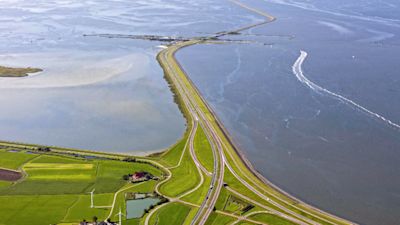RSPB's wildlife fears over 'outlandish' £2bn tidal barrier for The Wash linking Norfolk and Lincs

A £2bn scheme to build a tidal barrier across the Wash has been criticised as "outlandish" and "unworkable" by conservation charities.
Centre Port would see an 11-mile-long structure built across the estuary, connecting the Norfolk and Lincolnshire coasts with a road.
Port Evo, the UK developer behind the proposals, said it could generate tidal energy for around 600,000 homes and businesses and would include the world's first green-energy-powered container port.
They claim it would also act as a flood defence for more than one million people living in Norfolk, Cambridgeshire and Lincolnshire.
But the RSPB, Norfolk Wildlife Trust, Lincolnshire Wildlife Trust, the Wildfowl and Wetlands Trust (WWT), as well as the Wild Ken Hill Estate - home to the BBC's Springwatch - have all hit out at the plans.
They have called on both Port Evo and the government to rethink the proposals "to avoid catastrophic effects on nature and wildlife".
"The Wash is the UK’s most important estuary for wild birds, home to England’s largest common seal colony, and an important fishery," they said. "A tidal barrage would fundamentally alter the nature of the intertidal habitats on which this wildlife depends."
But Centre Port insists its mission is "to provide guardianship of both the ecology of The Wash and The Fens".
Chief executive James Sutcliffe described the project as a "one-stop shop and solution for the whole area".
"We are saving the Wash," he said. "We're not interfering with it at all. It's still tidal, the salt marshes, the bird wading areas will all still be there.
"But if this isn't there, and we have another storm that was worse than the one in 2013 which devastated the centre of Boston [Lincolnshire], all those banks would be washed away.
"One you get salt water into land, it's redundant for at least five years."
Mr Sutcliffe said he expected it to take at least three years to get planning approval with another three years of construction on top.
But James Robinson, director of conservation at WWT, said that showed the scheme's claims to be addressing the country's energy needs was a red herring.
"Building a barrage wouldn't address the energy crisis as it would take years to construct," he said.
"It would, however, cause permanent damage to one of the UK's most important wetland habitats with devastating effects on biodiversity at a time when we are facing a biodiversity crisis in the UK and worldwide."
The developers - who say the project would create 1,000 construction jobs and hundreds of permanent one - have secured seed capital and a power agreement with an energy provider.
They are now looking to raise £8m for a feasibility study.
Last week, an event was held at the House of Commons for MPs and civil servants to introduce the project.
Want a quick and expert briefing on the biggest news stories? Listen to our latest podcasts to find out What You Need To Know